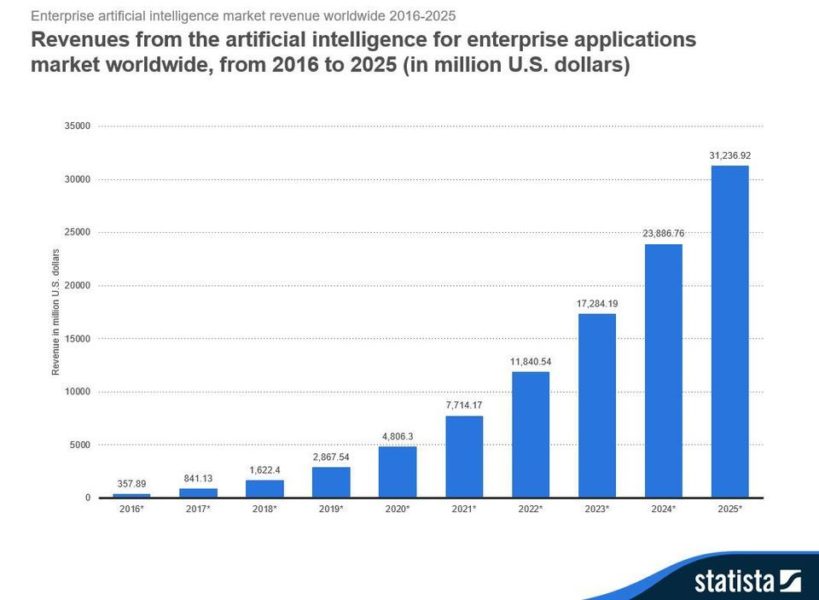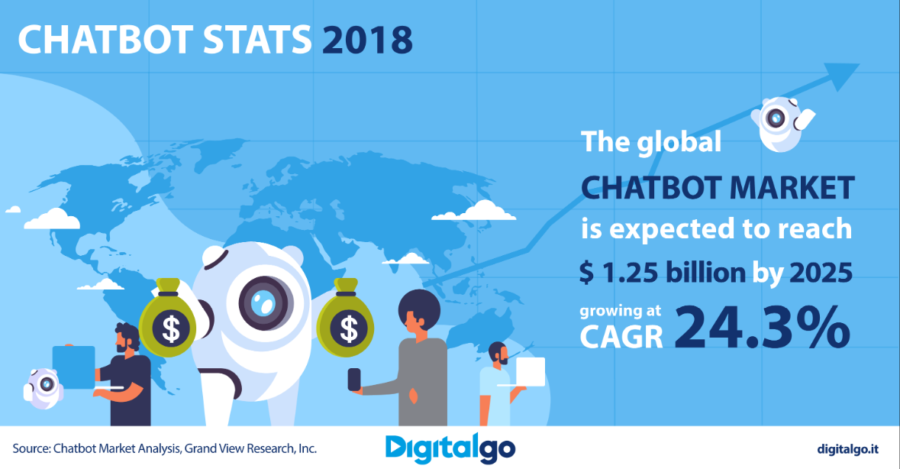Artificial Intelligence (AI) is reinventing the world, and mobile technology is the vehicle through which AI is gradually entering our lives. Once science fiction, powerful AI devices now fit neatly in our pockets.
AI-empowered applications, such as Apple’s Siri, Google Assistant and Samsung’s Bixby are already offering mobile users voice-based website navigation. The next generation of mobile technology will focus on devices and apps that know what end users need and want, and how to adapt to their expectations. AI is beneficial for everyone who depends on mobile technology, from professional to private applications.
It will open up new and faster revenue streams for businesses and will offer a more satisfying and quality life to mobile technology users.

The global mobile Artificial Intelligence market is expected to grow rapidly between 2018 and 2023. A recent report forecasted that the global AI market would reach USD 17. 83 billion by 2023, from US 5.11 billion in 2018. The growth of this market can be largely attributed to the furiously growing demand for AI-enabled mobile devices, the growing number of AI applications and the rise in cognitive computing.
Given all these factors, there’s no doubt that AI technology will entirely transform the mobile industry in the coming years.
Here’s how.
The Evolution of Chatbots
A chatbot is an AI-enabled application that bridges the gap between businesses and customers. It serves as a personal assistant to businesses and helps to handle a great number of repetitive day-to-day business operations – from processing data to posting social media updates, to supporting customers 24X7.

A chatbot can tell if the person on the other side is a machine or human being. It can effectively interact with a number of people at the same time, thereby cutting down human efforts and expenses. Considering the progressive demand and benefits of chatbots, these applications are likely to become an indispensable part of customer relationship management in the near future.
Personalized Apps
Nine out of ten marketers say their customers want personalized experiences. According to Gartner, companies that have fully invested in online personalization will outsell those who haven’t, by the end of this year. The same applies to the mobile app industry, and AI plays a crucial role when it comes to personalization.
Integration of AI, VR, and AR is fast becoming a standard across the mobile industry when it comes to delivering a more personalised experience for users. Using the machine learning capabilities of AI, companies can now sift through an enormous quantity of data on users’ behaviour and determine what their preferences are.
For example, streaming app Netflix uses Artificial Intelligence to provide their viewers with recommendations for movies and serials they might find interesting. Consumers can use AI-empowered applications to get personalized results which will reduce their scrolling time.
AI Paired with IoT
The application of AI in combination with IoT is now simplifying our lives to a great extent. IoT lets your devices communicate with each other. For example, you can connect wearables like eyeglasses and wristwatches to your smartphone. Medical devices are now connected to sensors, which obtain the patient’s health data and transfer it to the mobile app.
This data can be sent remotely to the doctor or any concerned person in case of emergency, hopefully reducing unnecessary hospital visits. Some IoT solutions offer health care, including assisted living, monitoring of chronic diseases, preventing care, etc.
Similarly, the power of IoT has taken home automation to a whole new level. Now, you can control home lighting, locks, and other household functions remotely using your mobile device.
Other ways in which IoT and AI are changing the mobile technology include smart cities, vehicle, smart grid, enterprise, agriculture, retail and a lot more.
AI in The Future
The potential of AI to collect, store and process incredible amounts of real-time data, integrated with the blazing-fast speed of soon-to-come 5G technology will shift businesses as well as customers to a whole new level. The mobile technology is going to be more intelligent and smarter with AI, inevitably driving growth and development in the mobile economy.
Disclaimer: This is a guest post written by Ralf of What Phone Australia

Leave a Reply